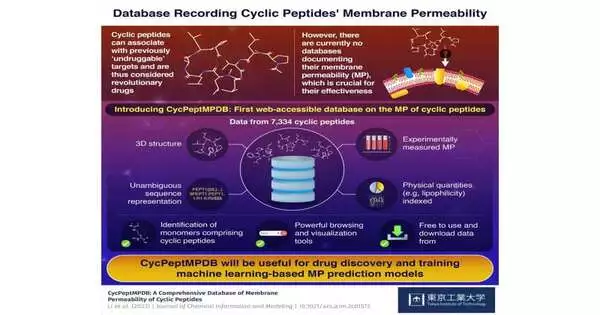Researchers at Tokyo Tech have developed a novel database called CycPeptMPDB that focuses on the permeability of cyclic peptides to membranes. This database could hasten the development of drugs based on these intriguing compounds. This database was made by compiling published data on thousands of cyclic peptides and neatly organizing it on an online-accessible platform. CycPeptMPDB could open the door to new computational and machine learning methods for screening and designing drugs with cyclic peptides because of its search and visualization capabilities.
Finding compounds that meet a number of seemingly incompatible requirements is one of the biggest challenges in modern drug design. They must be small enough to penetrate human cell membranes while being large enough to target different protein surfaces and protein-protein interactions. In order to maintain high specificity for the target protein (or proteins), the compounds must strike a delicate balance between size and specificity. If the compounds are too large, they may not pass through the cell membrane, which would affect their bioavailability. If they are too small, they would lose this specificity.
“CycPeptMPDB offers a number of features, including data storage, statistics and visualization, searching and analysis, and downloading. We anticipate that it will be a useful tool in cyclic peptide membrane permeability research.”
Professor Yutaka Akiyama,
According to scientists, more than 80% of all known proteins connected to diseases cannot be targeted by traditional small-molecule medications or medications based on antibodies. For this reason, cyclic peptide research has gotten really busy recently. These substances can, in theory, achieve the delicate balance needed for modern drugs.
An example of an organic molecule is a cyclic peptide, which is made up of amino acids connected in a lariat-like or circular pattern. Their ability to target intracellular protein-protein interactions, which have long been regarded as “undruggable,” is what makes them so appealing. Cyclic peptides are also easier to synthesize than antibodies, which has led many pharmaceutical firms to invest heavily in research on these substances.
The fact that cyclic peptides generally have low membrane permeability, which regulates their bioavailability and therapeutic effectiveness, and that the mechanisms underlying this low permeability are poorly understood is one of the biggest obstacles to be overcome in cyclic peptide research. As a result, it is challenging for researchers to choose candidate peptides for drug design that are likely to pass through the cell membrane. Furthermore, there are no publicly available databases that list the membrane permeabilities of known cyclic peptides at this time.
To make cyclic peptide research simpler for everyone, a group of scientists from the Tokyo Institute of Technology (Tokyo Tech) in Japan, led by Professor Yutaka Akiyama, made the decision to move forward. The team developed an online database called CycPeptMPDB that contains details on thousands of cyclic peptides, including their membrane permeability, as stated in their most recent paper, which was revealed to have been published in the Journal of Chemical Information and Modeling.
They collected information for the database from already-published papers and pharmaceutical patents. After looking through more than 40 publications, they gathered data on 7,334 cyclic peptides with a variety of chemical structures. They entered the database with the values for these peptides’ membrane permeability and other significant physical characteristics, like lipophilicity.
Additionally, the most likely 3D conformation of each peptide was determined and added to the database to enable further analysis and visualization of the molecules. Additionally, they created a brand-new descriptive notation (called HELM) to encode each cyclic peptide’s chemical structure, making it possible to refer to any cyclic peptide in the database with just a few words.
The team is very optimistic about their platform and thinks it could revolutionize the process of creating cyclic peptide drugs. “CycPeptMPDB performs a number of tasks, such as data storage, statistics and visualization, searching and analysis, and downloading. For research on cyclic peptide membrane permeability, we anticipate it will prove to be a useful tool, says Prof. Akiyama.
It is also important to note that databases like CycPeptMPDB are crucial for training machine learning models, which can speed up the selection of drug candidates and reveal hidden patterns in the data.
We will keep gathering information about cyclic peptides’ membrane permeability and entering it into CycPeptMPDB. Additionally, more integrated features and a more user-friendly interface will be added to the database’s online analysis platform in the future, according to Prof. Akiyama.
More information: Jianan Li et al, CycPeptMPDB: A Comprehensive Database of Membrane Permeability of Cyclic Peptides, Journal of Chemical Information and Modeling (2023). DOI: 10.1021/acs.jcim.2c01573





